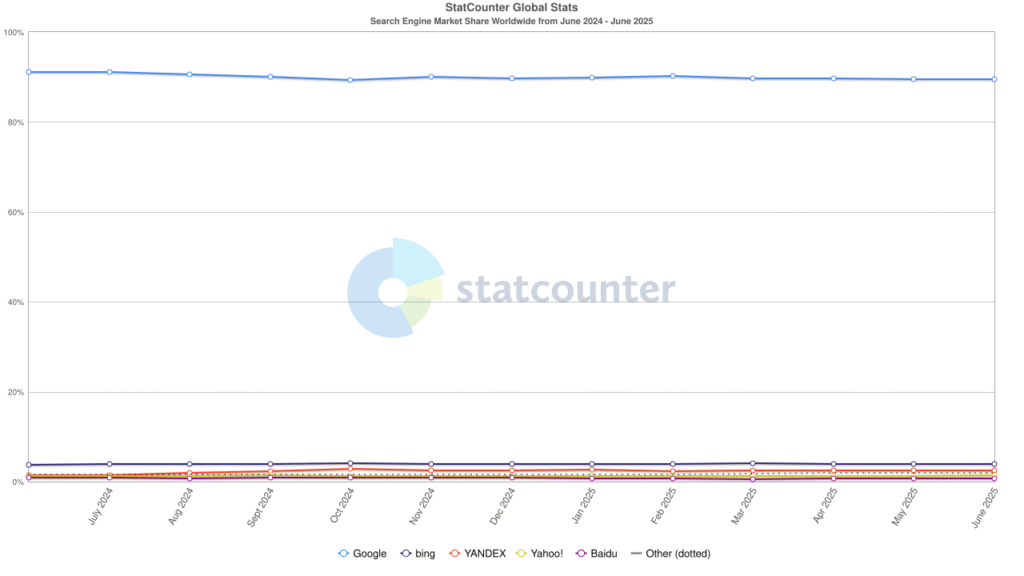
What is the Future of SEO? Key Trends, Search Shifts, and Brand Strategies for 2025
Sundar Pichai recently made a statement about SEO, saying it’s going to change even more significantly in 2025. Since then, speculation’s been flying across platforms, with everyone trying to guess Google’s next move. On forums, blogs, and LinkedIn threads, people have been discussing theories on what’s cooking up next. But here’s the thing, this isn’t anything new. If you’ve been in marketing for quite a while, you know this isn’t new. The only way to win is to stay curious and updated. That’s why we’re bringing you the latest outlook on what is the future of SEO.
Is SEO no longer Useful?
The answer is simple: no. But things have changed a lot, and this shift is only going to accelerate. Google’s dominance is facing new challenges – but it’s far from over. According to recent data, Google still dominates with around 83% of online searches. However, new players are stepping into the ring and posing serious competition. ChatGPT now accounts for approximately 4.33 percent of searches, YouTube stands at 6.79 percent, and other platforms, including social media, collectively contribute around 3.37 percent of search activity. The data suggests that we can expect the non-traditional search engines to grow.

But Google is changing itself.
In 2024, we saw multiple algorithm updates focused on improving content quality and user experience. Interestingly, these changes are helping smaller businesses.
One recent survey conducted by Semrush revealed that over 78% of 700+ users still consider SEO to be extremely or very valuable for their company.
So no, SEO is not dead. It is just evolving. Today, original content and understanding what users want matter more than technical tricks.
According to a report, Google still drives around 63.41% of all web traffic in the U.S. But one thing is for sure: the way people look for information is shifting fast. So, while it’s definite that SEO will still rule in 2025, it’s important to consider that people don’t only use Google.
SEO Lessons Brands Need to Learn to Thrive in 2025
These are some top things that you should keep in mind while doing SEO:
Search Intent is now more important than ever
Back in the day, all you needed was a bunch of keywords sprinkled into your page. But that was before Google really started paying attention to what users actually want. It’s no longer enough to just stuff the keywords. Now, Google cares about whether you’re answering the user’s question in a way that satisfies them. That’s the only way it can give competition to futuristic technologies.
If a user is searching for “best running shoes.” They must also be looking for options. They want comparison. So, what happens when they click on a page that only sells one pair of shoes? They hit the back button, frustrated, because it’s not what they were looking for. You didn’t offer what they needed, and so they moved on to the next result. That’s the same way Google is seeing your site now.
Backlinko, in one of its recent articles about SEO trends, revealed something interesting. They shared two comparisons:
On the one hand, when they searched for a term related to “tools” using a keyword research tool in 2024, the results were a mix of tools, guides, and blog posts. But by 2025, almost 90% of the results were actual tools you could start using immediately.
This shift indicates that people are no longer just seeking advice. They want the tool immediately. Google is clearly paying attention to when they make that change in behaviour. This simply states that search intent matters more than anything now.
AI is changing the norms
You know that content forms an integral part of SEO, whether you need product pages, blog posts, services pages, landing pages or press releases.
In past years, site owners have relied on AI to produce all forms of content on their websites.
However, only those who use AI to enhance their content, rather than creating it directly with AI, survive.
You can add tables or other visual elements to your content using AI. Just make sure to provide rich input to get quality output. So, in a way, the core contribution still comes from your end.
You can also use AI to source the relevant stats or quotes to give backing to your statements and increase their value. You can take suggestions from AI. You can repurpose your own gathered data or study and use it effectively. You can update your old content within seconds. Apart from all this, you can even create supplementary resources like templates and tools to increase the actionability of your content.
Write for AI technologies integrated with Google
As we know, Google is actively integrating various AI features across its products and services, for example,
AI overviews, formerly known as Search Generative Experience, offer AI-generated summaries at the top of search results for many queries. It provides a concise overview of the topic, along with links to explore the sources in more detail. This feature aims to provide faster and easier access to the information.
Multimodal Search: This feature lets users search by combining text, images, and possibly voice in the future. For instance, you can use Google Lens to find information about an object in a picture.
Experimental AI Tools: Google is also trying out tools like Notebooklm for research and discovering connections within uploaded sources, and Learn About for a more conversational learning experience.
Image Generation in Search: This allows you to generate images straight from the search bar using text prompts.
How can you optimize for the AI features?
The key lies in creating content that is totally user-centric, which means it should be easily understandable by both humans and algorithms. Here is how you can do it:
1. Create content that thoroughly covers topics and answers user queries in detail. Your goal should be to be the best resource for a given topic.
2. Provide supporting details such as examples, expert opinion and data to build your credibility and ensure proper adherence to E-E-A-T principles.
3. Update your content with fresh information and the most recent developments to maintain relevance.
4. Analyze different types of search intent in depth, such as informational, transactional, commercial, or navigational, and tailor your content to match users’ goals.
5. Anticipate users’ follow-up questions and address them proactively within your content.
6. Optimize for the long-tail keywords and question-based queries that reflect the natural language.
7. Use logical heading hierarchy to structure your content and make it easy for users and AI to understand relationships between different sections.
8. Break up large blocks of text with shorter paragraphs, bullet points, and numbered lists to improve the readability of your content.
9. Use relevant schemas, such as HowTo, Product, Article, etc., to help Google understand the type of content on your pages. Validate your schema markup using Google’s Rich Results Test tool to ensure it’s implemented correctly.
10. Create a network of interconnected content around specific topics (topic clusters). This signals your expertise and helps Google understand your site as a comprehensive resource.
11. Stay informed about the latest updates, such as the introduction of ASK engine optimization, niche search innovations, and algorithmic shifts from Google Search Central and other reputable sources.
CTR is dropping with the rise in zero-click searches
Click-through rates (CTRS) are falling because Google now provides people with answers directly on the search page using its new AI Overviews. Users no longer need to click on websites as often.
This is part of a more significant trend. Google’s been adding stuff like:
- Featured snippets
- People Also Ask boxes
- Calculators, converters, etc.
All of these make it easier to get info without clicking. That’s what we call zero-click searches.
What this means for you:
- For many keywords, fewer people will click your link even if you rank high.
- But if Google uses your content in the AI Overview, you might still get traffic, especially if you weren’t high up before.
- Some searches, such as buying something or using a tool, still require a real website. Those are your best bets now
What to do to counter this?
Be active everywhere, like YouTube, Reddit, LinkedIn, so Google knows your brand.
Focus on keywords where users want more than a quick answer. Go after things like these:
- Tools
- Step-by-step guides
- Product comparisons
- Anything that needs visuals or action
Building authority across the web demands more than just backlinks
A few years ago, SEO was all about backlinks. The more you had, the higher you ranked. It didn’t really matter where they came from, as long as they existed. But that’s changed now.
Now, Google’s smarter. It’s not just counting links, it’s looking at context. Are people actually talking about your brand in a meaningful way? Are you being recognized as an expert in your niche? That’s what matters the most now.
Even if there’s no direct link, being discussed on forums, in news articles, or on Reddit can make a significant difference. It helps build trust with both Google and actual people.
It’s called brand authority. And it’s becoming one of the most significant ranking factors.
But links still help. But what’s even more powerful is when people naturally talk about your brand as a trusted source, and you should not ignore it anymore.
What will the future of SEO look like in the coming years?
The one key takeaway from this blog post is that all Google is doing is trying to maintain its supreme position by making search super convenient for users. As long as your SEO supports that effort, you’re going to surf all the algorithmic waves no matter what the future holds.
It’s all about finding new smart ways to rank, not chasing loopholes.
If you share that vision for SEO, talk to our SEO Toronto Experts today. We can help you plan an extensive and futuristic strategy for your website.

 SEO SERVICES
SEO SERVICES Digital Marketing
Digital Marketing PPC
PPC
 8146536963
8146536963

